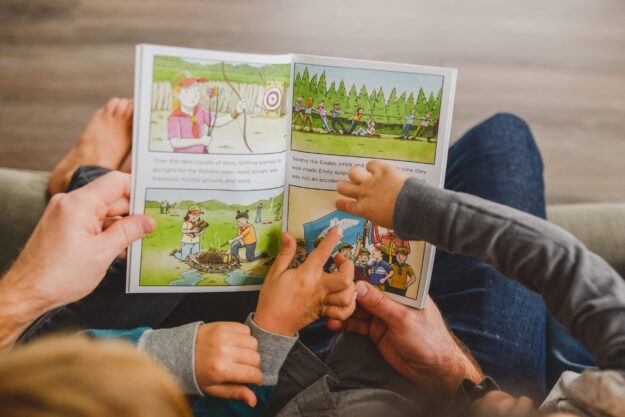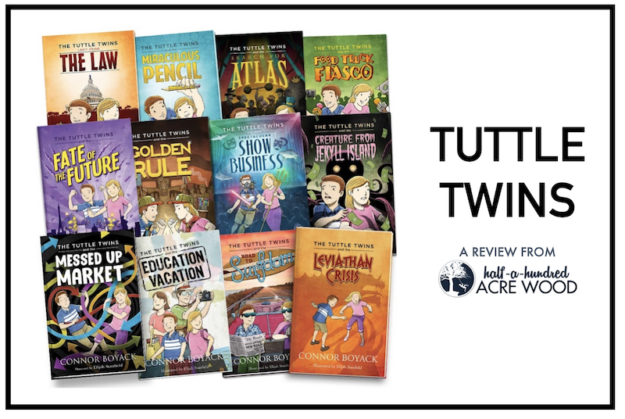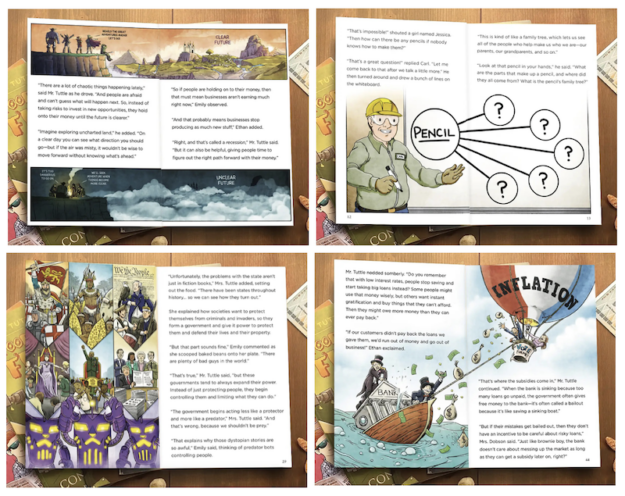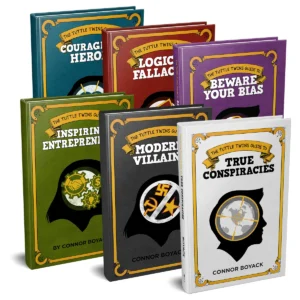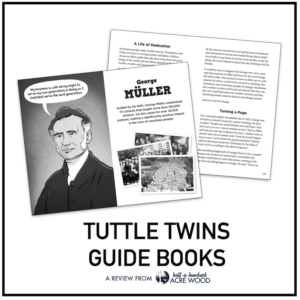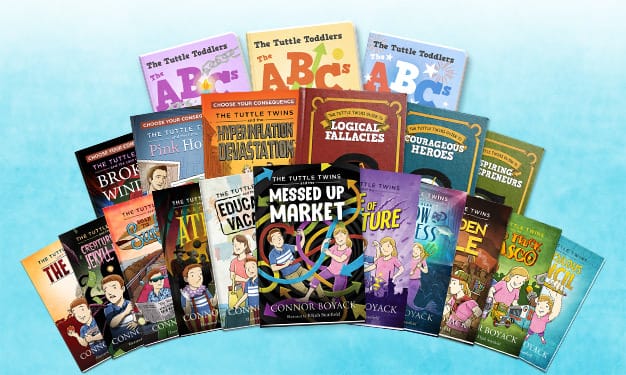Individual liberty. Fair Competition. Entrepreneurship. Civics. Economics. About a year ago, we grabbed some books that simplified these complex ideas so that even our youngest son could understand and engage in meaningful conversation. The series has easily become a favorite in our home. Even our teens have enjoyed the books — and the cartoon!
The Tuttle Twins series provides tools for children to think critically and discern when they are being manipulated by ideas. Even though the stories are based on thought-provoking books and essays by famous authors, they are relevant and easy to understand. This series has bridged a gap in communicating current events and political and economic topics with our youngest son. By learning these concepts at a young age, he is better equipped to face the bombardment of ideas later in life.
Most recently, we’ve been reading True Conspiracies, Courageous Heroes, and Inspiring Entrepreneurs from the Tuttle Twins Guidebook Series, written for pre-teens and teens (and, apparently, for parents). Tuttle Twins Guidebooks teach pre-teens, teens, and adults about economic & political outcomes, logical fallacies, biases, critical thinking, entrepreneurship, and more…
The Tuttle Twins Children’s Books in a Nutshell
Using engaging and memorable stories, Tuttle Twins Children’s Books teach the principles of freedom to children ages 5-11+. These stories present what are often complex and boring concepts in an understandable way that encourages children to ask questions and discuss big ideas. The series includes:
- The Tuttle Twins Learn About The Law, which is based on The Law by Frédéric Bastiat. Through a story involving pirates, the Tuttle twins explore individual rights and true laws that protect those rights, along with our personal responsibility in helping others and the importance of limited government.
- The Tuttle Twins and the Miraculous Pencil, which is based on Leonard Read’s classic essay “I, Pencil.” In this story, the Tuttle twins embark on a factory tour where they learn how pencils are made using goods from all over the world. Children learn the importance of a free market economy with division of labor, competition, and trade.
- The Tuttle Twins and the Creature from Jekyll Island, which is based on The Creature from Jekyll Island by G. Edward Griffin. In this story, children learn about how money works, including bartering, savings, inflation, monetary policy, and the Federal Reserve, as the Tuttle twins explore a farmer’s market and county fair.
- The Tuttle Twins and the Food Truck Fiasco, which is based on Economics in One Lesson by Henry Hazlitt. Through a story involving a food truck, the twins learn about protectionism and laws that create unfair advantages which negatively impacts the economy. They learn about business regulations, fair competition, and basic market principles as they embark on a campaign to overturn those laws.
- The Tuttle Twins and the Road to Surfdom, which is based on The Road to Serfdom by F.A. Hayek. By exploring a new road built to connect tourists to a beach named Surfdom, the Tuttle twins learn about central planning, collectivism, individualism, eminent domain, and unintended consequences.
- The Tuttle Twins and the Golden Rule, which is based on Ron Paul’s speeches compiled in A Foreign Policy of Freedom. Through their experience at a summer camp, the twins learn about the Golden Rule and how it not only applies to family and peers but also to international relations among governments.
- The Tuttle Twins and the Search for Atlas, which is based on Atlas Shrugged by Ayn Rand. By working as clowns in the circus, the Tuttle twins explore personal responsibility, work ethic, incentives, supply and demand, and the harmful results of socialism. In this book, children will learn how society works when laws are set up to equalize results rather than reward individual efforts.
- The Tuttle Twins and their Spectacular Show Business, which is based on Competition & Entrepreneurship by Israel M. Kirzner. This book introduces children to the world of entrepreneurship, including business planning, budgeting, investment, networking, and profit.
- The Tuttle Twins and the Fate of the Future, which is based on Anatomy of the State by Murray Rothbard. By watching a dystopian film, the Tuttle twins tackle ideas involving personal freedom, the role of government, and coercion vs. persuasion. In this story, children learn the important skill of persuasion in improving the communication skills.
- The Tuttle Twins and the Education Vacation, which is based on The Underground History of American Education by John Taylor Gatto. In this story, the Tuttle family responds to an award-winning educator’s discussion of problems with schooling and how children are best educated – through discovering their interests and developing their abilities. The story explores compulsory education, conformity, free will, and how to become a lifelong learner.
- The Tuttle Twins and the Messed Up Market, which is based on Human Action by Ludwig von Mises. As the Tuttle twins establish a “Children’s Entrepreneur Market” in which they loan money to help other kids establish their small businesses, they learn all about interest, risk, bailouts, subsidies, free markets, trade-offs, and the benefits of delayed gratification.
- The Tuttle Twins and the Leviathan Crisis, which is based on Crisis and Leviathan by Robert Higgs. Through an adventure game, the Tuttle twins discover how fear and ignorance often lead to the sacrifice of freedom for the promise of security, a sacrifice which results in governments gaining in power.
- The Tuttle Twins and the 12 Rules Boot Camp, which is based on 12 Rules for Life by Jordan B. Peterson. In this story, the Tuttle twins set up a boot camp for their uncle in which they share 12 rules to practice for successful living, emphasizing responsibility, discipline, integrity, courage, and productivity.
- The Tuttle Twins and the Medals of Merit, which is based on Marxism: Philosophy and Economics by Thomas Sowell. While at a track meet, the Tuttle twins learn the importance of rewards based on individual achievement rather than identity or circumstances. In this book, children will explore the ideas of merit, effort, fairness, and individual responsibility as they encounter Marxist ideas in a system emphasizing equal outcomes.
Each book includes questions to help families engage in meaningful discussions. Also available are workbooks, audiobooks, and parent guides. (The Tuttle Twins Combo Pack includes free PDF workbooks.) Use the code EXTRA15 for 15% off books or bundles.
The Tuttle Twins Guidebooks in a Nutshell
Although we’ve owned the Tuttle Twins Children’s series for about a year now, we just recently started reading the Tuttle Twins Guidebooks which are written for ages 12+ (but are also enjoyed by our 10-year-old — and his parents!).
These illustrated books introduce the reader to lesser-known stories from history as well as logical fallacies and biases. They not only build critical thinking skills, but they also help students to think about courage and integrity, entrepreneurship and responsibility, and upholding what’s true and right. There are six books available:
- In Logical Fallacies, teens will learn how to spot flaws in logic. They’ll recognize misinformation and identify logical fallacies (bad arguments) which will, in turn, help them to understand when others are making false claims, no matter how persuasive their arguments may be. This book provides teens with tools for learning to become better thinkers, better communicators, and better debaters. Read a sample chapter.
- In Inspiring Entrepreneurs, teens are introduced to several entrepreneurs from history and how they made risky decisions to develop innovative solutions to real-world problems. At times, these risk-takers were successful, but at other times, they failed. Through their example, students can learn what it takes to diligently pursue a solution to real-world problems and how to persevere through failure. Read a sample chapter.
- Courageous Heroes is filled with stories of brave men and women who fought for what was right in the midst of great opposition. Read a sample chapter.
- Beware Your Bias helps the reader identify biases in their thinking so that they are not as easily manipulated. They will not only will become more capable of understanding themselves and others, but they’ll also become better-equipped to make wise decisions. Read a sample chapter.
- Modern Villains introduces teens and adults to villains from history, why they committed such evil acts, and why others allowed them to do so. Read a sample chapter.
- In True Conspiracies, teens and adults learn the gripping stories of some of the most disturbing events from history. It challenges us to question and not blindly trust those in power as we seek truth. Read a sample chapter.
Other resources available from Tuttle Twins include:
America’s History. Designed for elementary students, these two volumes cover the philosophical ideas that shaped the founding of the United States of America with a focus on events from 1215 through 1791.
Free Market Rules. With related activities designed for Ages 5-11 and Ages 12-17, this economics curriculum may be used by the entire family to explore free market economics.
Choose Your Consequence series (Teen Fiction, Age 12+). For preteens and teens, this series allows the reader to make decisions and then follow those decisions through to their resulting consequences. With 37 different endings to explore across five books, it helps to develop a deeper understanding of real-world choices. (Note that these books contain violence, peril, and death.)
Tuttle Twins Magazine. Each monthly issue features short stories, articles, activities, and young entrepreneurs to learn about liberty, history, free markets, and personal responsibility.
Tuttle Toddlers. Even toddlers can learn about economics, liberty, and U.S. history through these number and alphabet board books.
Use the code EXTRA15 for 15% off books or bundles. If for some reason, you’re not satisfied, Tuttle Twins offers a 100% Unconditional Money Back Guarantee.

